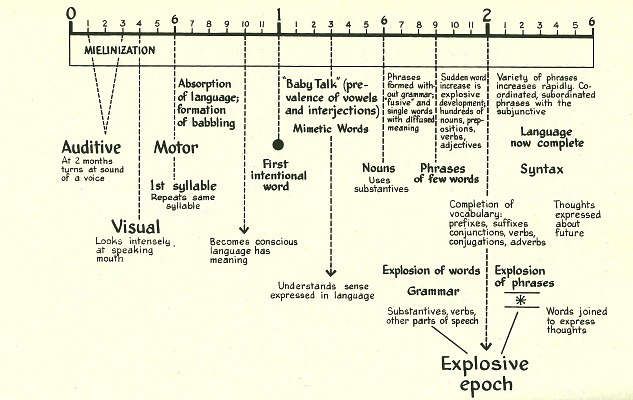Sensitive Periods
The sensitive period: it comes for a moment but its benefits last for a lifetime ~Maria Montessori
Montessori sensitive periods refer to a period of time when a child’s interests are focused on developing a particular skill or knowledge area. During what Maria Montessori describes as the child’s absorbent mind, birth to age 6, is when most sensitive periods occur.
Dr. Montessori identified six sensitive periods:
Sensitivity to Order ~ 1 – 3.5 years
The sensitive period for order is a desire for consistency and repetition. During this time babies and children are striving to sort out and categorize all their experiences, and it is easier for them to do this if there is some kind of order in their lives. An established routine, an ordered environment, and established ground rules will help to keep your child from being disrupted by disorder.
Sensitivity to Language ~ 0 – 6 years
Speaking ~ 7 months – 3 years
Your baby hears your voice and watches your lips and tongue – the organs of speech – from birth, absorbing all the time. It is important to speak to your child in clear language (no baby talk), read to them and allow them to speak their needs.
Letter Shapes & Sounds ~ 2.5 years – 5 years
Children become very sensitive to and interested in letter shapes and sounds. Activities such as tracing sandpaper letters with their fingers and correlating the sound of the letter with its shape are great in supporting this sensitive period.
Writing ~ 3.5 years – 4.5 years
This sensitive period begins when the child learns the alphabet. Then they learn the sight words, which form the foundation for reading and writing skills.
Reading ~ 4.5 years – 5.5 years
From the basis of writing your child can learn to read. Reading aloud to your child will help them improve their own reading skills.

Sensitivity to Walking ~ 0 – 6 years
Gross & Fine Motor Development ~ Birth – 2.5 years
When a child first learns to walk they have a need to practice and perfect the skill. Allow your child to crawl, pull up and encourage walking with or without assistance. Toys or materials that allow your child’s hands to touch, turn, insert and grasp small items help with developing fine motor skills and hand-eye coordination.
As they get older, your child is improving their coordination of fine movements such as being able to hold small items with a pincer grip and release voluntarily. Gross motor coordination can be supported by walking, running, balancing and jumping.
Sensitivity to the Social Aspects of Life ~ 2.5 – 5 years
At this age, children learn that they are part of a group and develop an intense interest in other children his/her own age. This is when children learn to develop friendships and participate in group play. Children begin to model their behaviour on adult social behaviour and gradually acquire the social norms of their group. Manners and courtesy are modelled by the adults.
Sensitivity to Small Objects ~ 0 – 5 years
When a child has a larger environment to explore, he/she is drawn to small objects such as insects, pebbles, stones and grass. The child will pick something up, look at closely and perhaps put it in his/her mouth. The urge to pay attention to detail is part of their effort to build up an understanding of the world.
Sensitivity to Learning Through the Senses ~ 2 – 6 years
This sensitive period is characterized by the child’s fascination with sensorial experiences (taste, smell, sounds, weight, and touch). These experiences provide children with a system to classify objects within their environment.
SHIJINA RIJESH
